
monticello/Shutterstock
Breakfast isn't just the most important meal of the day, it's incredibly profitable for companies with the U.S. breakfast foods market valued at over $200 billion. Whether you prefer to start with a savory meal filled with eggs, bacon, or sausage; have a sweet tooth and like to load up on pancakes, waffles, and syrup; or instead prefer a light, healthy breakfast like a smoothie or fruit bowl, brands are happy to meet consumer breakfast desires.
But unfortunately, popular breakfast items have often been the subject of widespread recalls due to the presence of contaminants, allergens, and other health hazards. From fast and convenient options like frozen breakfast sandwiches to must-have ingredients like eggs, popular breakfast foods are no stranger to recalls by the FDA or USDA. While some recalls are small and impact only a single product, others reached record-breaking numbers, all in an effort to keep consumers safe.
2025 Bonya yogurt parfait recall
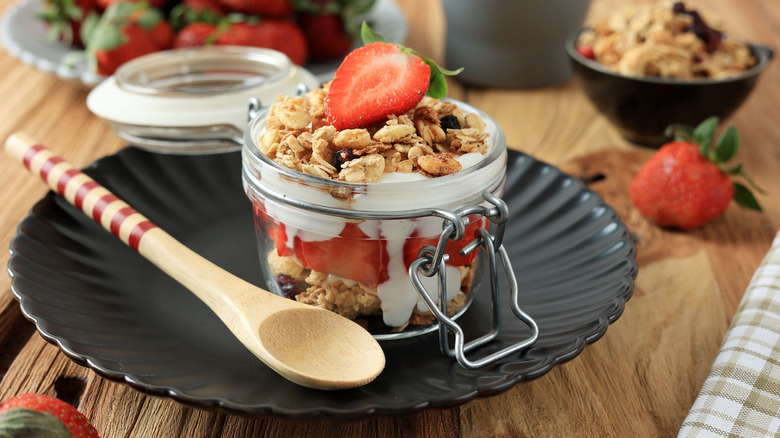
Ika Rahma/Getty Images
In May 2025, the U.S. Food and Drug Administration announced a recall on a breakfast staple: yogurt parfaits. The Bonya brand low-fat yogurt parfaits produced by Knockroe Inc. were distributed nationwide and did not disclose the possible presence of almonds on the labels, making those with almond allergies are at risk for a potential severe reaction. This was particularly dangerous because tree nuts (which includes popular nuts like almonds, cashews, and walnuts) are one of the allergens linked most often to anaphylaxis, according to the American College of Allergy Asthma and Immunology. Like other food allergies, reactions to almonds can lead to hives, itching, abdominal pain, and in extreme cases, life-threatening reactions that impair breathing.
Almonds were mistakenly added to the granola used in the parfaits due to disruptions in the company's production process according to the FDA. As a result, the almond granola was placed in the wrong products, including the vanilla, strawberry, raspberry, peach, mango, and blueberry low-fat parfaits. Those who purchased the parfaits were encouraged to throw them away or return to the place of purchase.
2025 Lamb Weston hash brown patty recall

Krblokhin/Getty Images
Hash browns are the savory, filling, and delicious breakfast side that complements everything from eggs to pancakes. But in April 2025, the frozen variation of delicious potato-based snack made by Lamb Weston posed a safety hazard due to the possible presence of plastic pieces. During an X-ray test, the company discovered that the potato patties were potentially contaminated with small plastic pieces anywhere from 1 to 8 millimeters in size.
The U.S. Food and Drug Administration listed the recall as Class II, indicating that it wasn't likely to cause severe, long-term health impacts. The presence of plastic, however, did pose a choking risk and could have lead to dental damage or internal injury. In total, nearly 35,000 packs of the hash browns were recalled from multiple states including Arizona and Hawaii and international locations including Japan, Taiwan, and the United Arab Emirates. Consumers were urged to toss any affected products and check their freezers carefully, as some of the products had best-by dates well into 2026.
2025 Smith Packing breakfast sausage recall
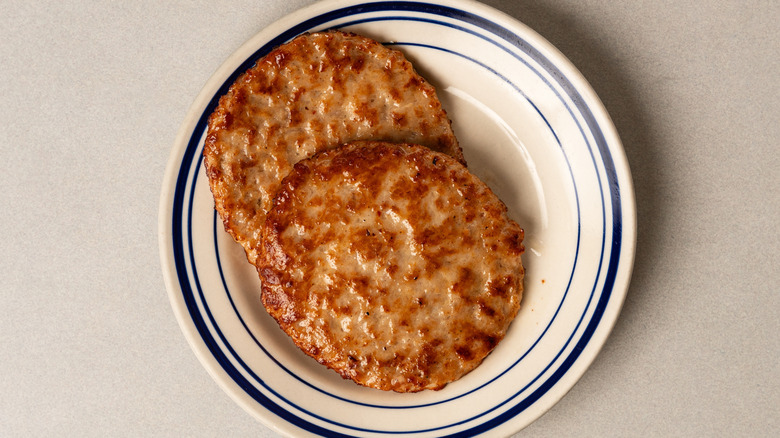
Hope Phillips/Shutterstock
Nearly 19,000 pounds of meat were recalled in April 2025 because of excessive levels of sodium nitrite. The U.S. Department of Agriculture's Food Safety and Inspection Service announced the recall on several Smith Packing products produced between February and late April.
Sixteen different meat products were recalled — from bologna to hot dogs to breakfast sausage — after several customers complained about their products looking and tasting suspicious. Luckily, about 90% of the affected products were not shipped to stores, minimizing any impact to consumers. Palmer Foods, Smith Packing's main distributor, worked with the brand and the USDA to identify 34 impacted customers and ensure any inedible meat they had purchased was destroyed.
Sodium nitrate is typically used to prevent excessive bacterial growth in packaged foods, but consuming too high of levels can lead to negative health outcomes and even, in extreme cases, death. Due to the possible severe outcomes, this recall was classified as Class I (the most severe).
2025 Hearthside Food Solution breakfast sandwich recall

Lauripatterson/Getty Images
In early April 2025, Hearthside Food Solutions announced a recall on nearly 500,000 pounds of its sausage and bacon breakfast sandwiches. Both sandwich varieties use French toast as the bread, which contains sesame flour. The labels, however, did not disclose the presence of this allergen. The ninth most common allergy in the U.S., sesame allergies can lead to mild reactions like hives or severe anaphylaxis. Due to the potential high-risk nature of allergy exposure, the USDA classified this recall as Class I.
The majority of the recalled sandwiches were shipped to nationwide locations of the Army & Air Force Exchange Services. The sandwiches, however, were produced between April 2025 and March 2025, and have a 12-month shelf-life, so the USDA is encouraging consumers to check their freezers and discard any remaining sandwiches to avoid allergic reactions. As of June 2025, no adverse events had been reported.
2025 Pearl Milling Company pancake and waffle mix recall

Olgalepeshkina/Getty Images
In January 2025, The Quaker Oats Company announced a recall of Pearl Milling Company's Original Pancake & Waffle Mix. The initial limited recall was for 10,000 cartons of the two-pound boxes of the mix because they may have contained undeclared milk that could lead to serious allergic reactions.
The recall affected 11 states, including Arkansas, Illinois, Kentucky, Nebraska, and Wisconsin. About a month later, in February 2025, the FDA reclassified the recall and elevated it to Class I. This classification by the FDA indicated that exposure could lead to serious threats to health and possibly even death.
Those who purchased the products with the affected UPC code and best-by date — and had a milk sensitivity or allergy — were encouraged to discard the pancake mix to avoid any illness or allergic reaction; they could instead use a different mix or whip up some homemade old fashioned pancakes. As of early June 2025, no illnesses had been reported.
2024 Treehouse frozen waffle and pancake recall

Kate Wieser/Getty Images
A nationwide recall of frozen waffles and pancakes began in October 2024, impacting a range of TreeHouse Foods' products. The voluntary recall included breakfast favorites ranging from frozen toaster waffles, pancakes, and flavored items like buckwheat wildberry waffles and chocolate chip pancakes. Though initially only certain products were recalled, the recall was later expanded to include everything produced in a specific facility.
All of these products were all potentially contaminated with listeria monocytogenes, an organism that can cause serious — and sometimes fatal — infections. It can lead to gastrointestinal symptoms like vomiting and diarrhea, but can also cause flu-like symptoms including fatigue, aches, and headaches. Though symptoms are usually mild (especially in healthy adults), the infections can be particularly dangerous for those who are pregnant, young children, and the elderly.
TreeHouse Foods produced food under multiple brand names for major national retailers including Target, Wegmans, Kodiak Cakes, and H-E-B. Despite the widespread, nationwide nature of the recall, no illnesses were ever reported.
2024 Classic Delight breakfast sandwich recall
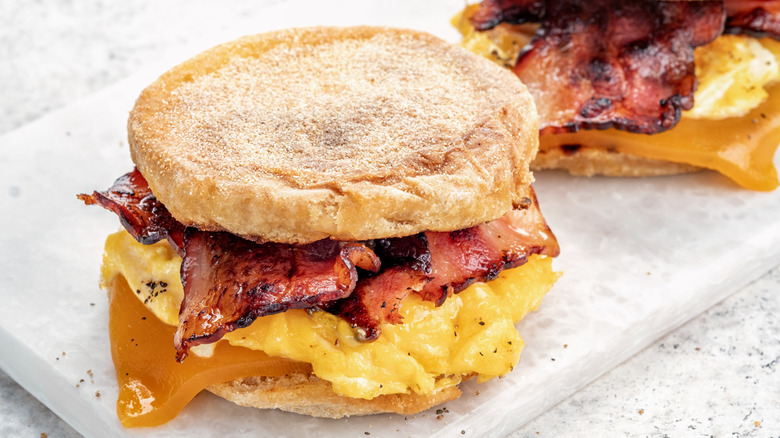
Azurita/Getty Images
In June 2024, sandwich producer Classic Delight issued a voluntary recall of many products — including a few breakfast sandwich varieties — due to possible exposure to listeria monocytogenes. The recall began after the food-borne bacteria was discovered in an environmental sample, creating a cascading effect that led to recalling tainted products had been distributed to 14 states including Arkansas, Maryland, New York, Tennessee, and Texas.
The recall was classified as Class II, indicating that the sandwiches could lead to temporary or reversible health problems (but likely posed little risk of serious health impacts). The Federal Drug Administration's warning covered 25 different sandwich types, from lunch staples like a turkey and cheese sub sandwich to breakfast favorites like ham, egg, and cheese muffins and sausage, egg, and cheese biscuits. Thousands of cases were recalled, both of Classic Delight and Wakefield brand products, and consumers were urged to toss any possibly contaminated products.
2024 Wellsley Farm Greek yogurt recall

Mizina/Getty Images
Greek yogurt is a popular breakfast item not only for its tart, creamy flavor but also for its impressive nutritional value. It is filled with calcium, protein, and vitamins, and it can even improve bone health and lower blood pressure. It also tastes delicious alone, paired with fruit, or in smoothies and sauces, and can be used in countless recipes (and even some you may not expect).
Nearly 16,000 cases of this breakfast staple produced by Wellsley Farm were recalled in December 2024. The brand's vanilla non-fat Greek yogurt in 40-ounce containers were the subject of a Class II recall because of possible contamination with small pieces of plastic. Plastic is often used in food production and packaging, but when food is exposed to plastic contaminants it can lead to choking, digestive blockages, chemical exposure, or even internal injuries.
The impacted product was shipped to three states: Connecticut, Kentucky, and Maryland. The affected yogurt was pulled from store shelves and consumers who had purchase products that were potentially impacted were instructed to throw it out and seek a refund from the place of purchase.
2023 Belvita breakfast sandwich recall
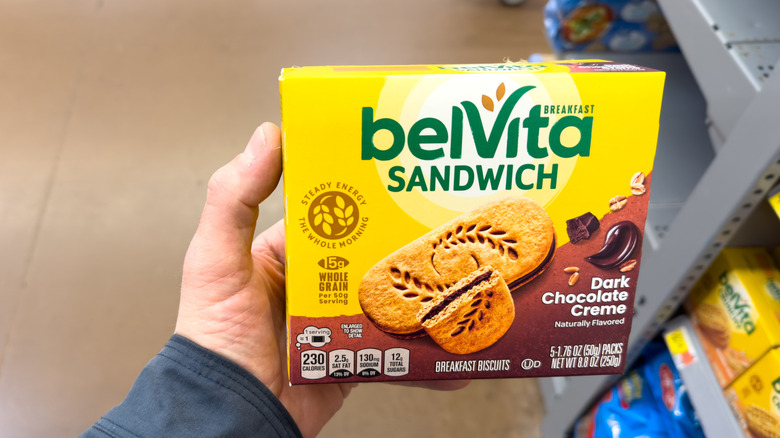
ZikG/Shutterstock
Not only are breakfast sandwiches delicious, but they're also a convenient, grab-and-go option for busy mornings. While many think of breakfast sandwiches as something like bacon, egg, and cheese, Belvita instead offers sweet, biscuit- based sandwiches for those with a sweet tooth. But in July 2023, two of these sandwich varieties posed potential risks to those with nut allergies.
The cinnamon brown sugar with vanilla creme and dark chocolate creme sandwiches with certain "best by" dates were potentially contaminated with peanuts on the manufacturing line. The issue was uncovered during a manufacturing inspection and peanut protein residue was found on the machinery used to make the products.
A peanut allergy is the most common food allergy in children under 18 and the third-most common allergy in adults. Allergic reactions can range from mild (like hives or itchiness) to life-threatening reactions like anaphylaxis. There were three unconfirmed reports of possible allergic reactions connected to this recall, and those with peanut allergies were encouraged to toss any of the affected products.
2022 Smithfield bacon recall
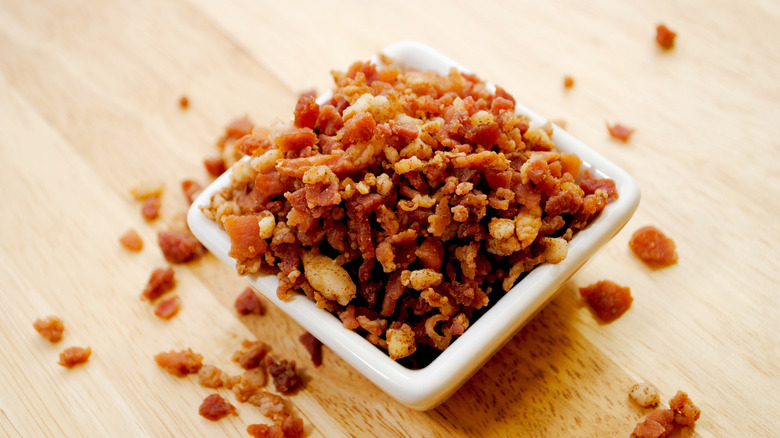
Collins Unlimited/Shutterstock
Bacon is the perfect complement to any breakfast, from pancakes to eggs to bagels. But in May 2022, certain bacon products by Smithfield Packaged Meats Corp. were recalled due to potential contamination with metal. Though it was never confirmed in this case, metal contamination is often caused by the machinery and equipment that processes the food. Not only can these metal fragments lead to injuries like broken teeth or cuts, but they can also carry bacteria and increase the chance of food-borne illnesses.
The items, produced between February 21 and 23 and March 3 and 5 of 2022, were recalled due to a customer complaint. The recall impacted a range of products and a range of precooked bacon toppings, including Smithfield and Member's Mark brands that had been shipped and distributed nationwide. All in all, the recall accounted for over 185,000 pounds of bacon products. Luckily, no injuries were ever reported.
2020 Blendtopia smoothie kit recall
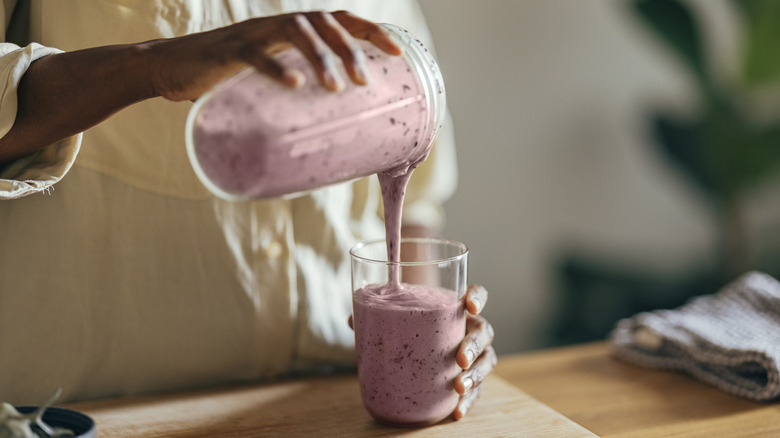
Miniseries/Getty Images
In February 2020, Blendtopia announced a recall of its Superfood Smoothie Kits because of potential contamination with listeria monocytogenes. Listeria is a bacteria that causes an infection that leads to stomach upset, like vomiting. It can also cause flu-like symptoms like fever, chills, and fatigue according to the Mayo Clinic. While listeria is not typically dangerous for healthy people, it can be especially serious for those who are pregnant, have compromised immune symptoms, and the elderly.
The recall affected five of the brand's different varieties, including the "Glow" smoothie kit — a mix of pineapple, banana, and turmeric— and the "Detox" smoothie kit featuring celery, spinach, lemon, and cayenne.The voluntary recall impacted nearly 30,000 cases of the 7-ounce kits sold at grocery stores in Michigan and online. Consumers who had purchased products with certain best by dates were directed to discard them or return them to the store where they were purchased.
2018 Rose Acre Farms egg recall

Penpak Ngamsathain/Getty Images
Whether scrambled, fried, or poached, eggs are a must-have for many every morning. But in November 2017, people began falling ill with salmonella Braenderup, with 45 cases being reported across 10 states over the next few months. The Center for Disease Control traced the illnesses back to shell eggs produced by Rose Acre Farms in North Carolina, identifying it as the likely source of the outbreak.
The farm, which produced nearly 2.3 millions eggs per day from 3 million hens distributed eggs to nine states including Florida, New York, North Carolina, New Jersey, and Colorado. To help prevent additional illnesses, Rose Acre Farms initiated a voluntary recall over 200 million eggs that were potentially contaminated. This was the second-largest recall on record, second only to the 2010 egg recall (also as the result of salmonella).
In this outbreak, the illnesses were caused by the salmonella braenderup strain of bacteria. Salmonella in general is a food-borne bacteria that can lead to fever, diarrhea, vomiting, and abdominal pain. It can also have very extreme, though rare, symptoms that lead to a severe blood-borne infection, making this recall vital to protect consumers.
2016 Eggo waffle recall
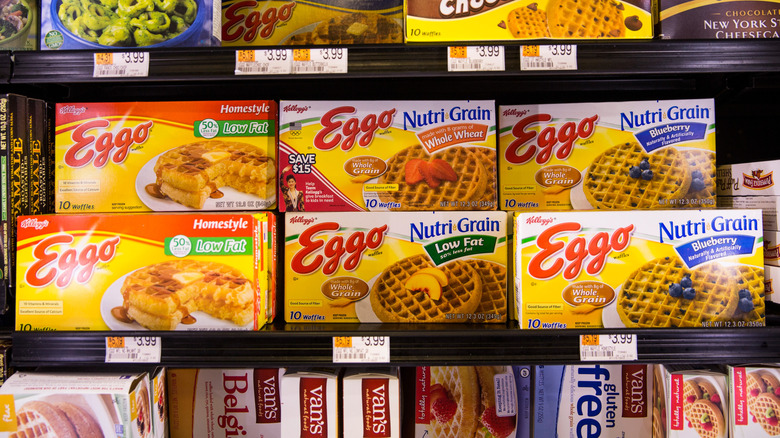
Andrew Burton/Getty Images
In September 2016, about 10,000 cases of Eggo's nutri-grain whole wheat waffles were recalled due to possible contamination with listeria. The bacteria was discovered as part of a routine test, sparking the recall that impacted 25 states including Colorado, Indiana, Maine, and Wyoming.
Though healthy people rarely become ill from exposure to listeria, it can be particularly detrimental in children, the elderly, and those with compromised immune systems or pregnant women. Because the bacteria can survive both refrigeration and freezing, even frozen foods — like Eggo waffles — aren't immune to contamination.
Eggo isn't a stranger to recalls due to listeria; in 2009, the bacteria was also found in its Atlanta factory and in January 2010, the Federal Drug Administration published a letter to Kellog (the owner of Eggo) criticizing its handling of food safety. After several recalls, some may consider exploring other frozen waffle brands to determine which brand is better for themselves.
2010 Quality Egg recall

D3sign/Getty Images
In July 2010, a nationwide uptick in the number of Salmonella Enteritidis caused the Center for Disease Control to take notice. Nearly 2,000 people became ill (though luckily no deaths were reported) across multiple states due to an initially unidentified source.
Eventually, the CDC's investigation led to recalls by Wright Country Egg and Hillandale Farms, both of Iowa, totaling about 500 million fresh eggs — the nation's largest ever egg recall. It's no surprise that so many eggs were recalled, given that nearly 50% of people eat them for breakfast.
FDA investigators found salmonella all over both farms, along with uninhabitable conditions for the chickens, leading them to tie the outbreak back to these locations. The eggs had been sold under many brand names and to restaurants alike, contributing to the widespread nature of the illnesses.
The owners of the Quality Egg LLC — the company that managed both Wright County Egg and Hillandale Farms — were later charged with a misdemeanor associated with the outbreak. The company was also charged with the felony of introducing misbranded food into interstate commerce.



